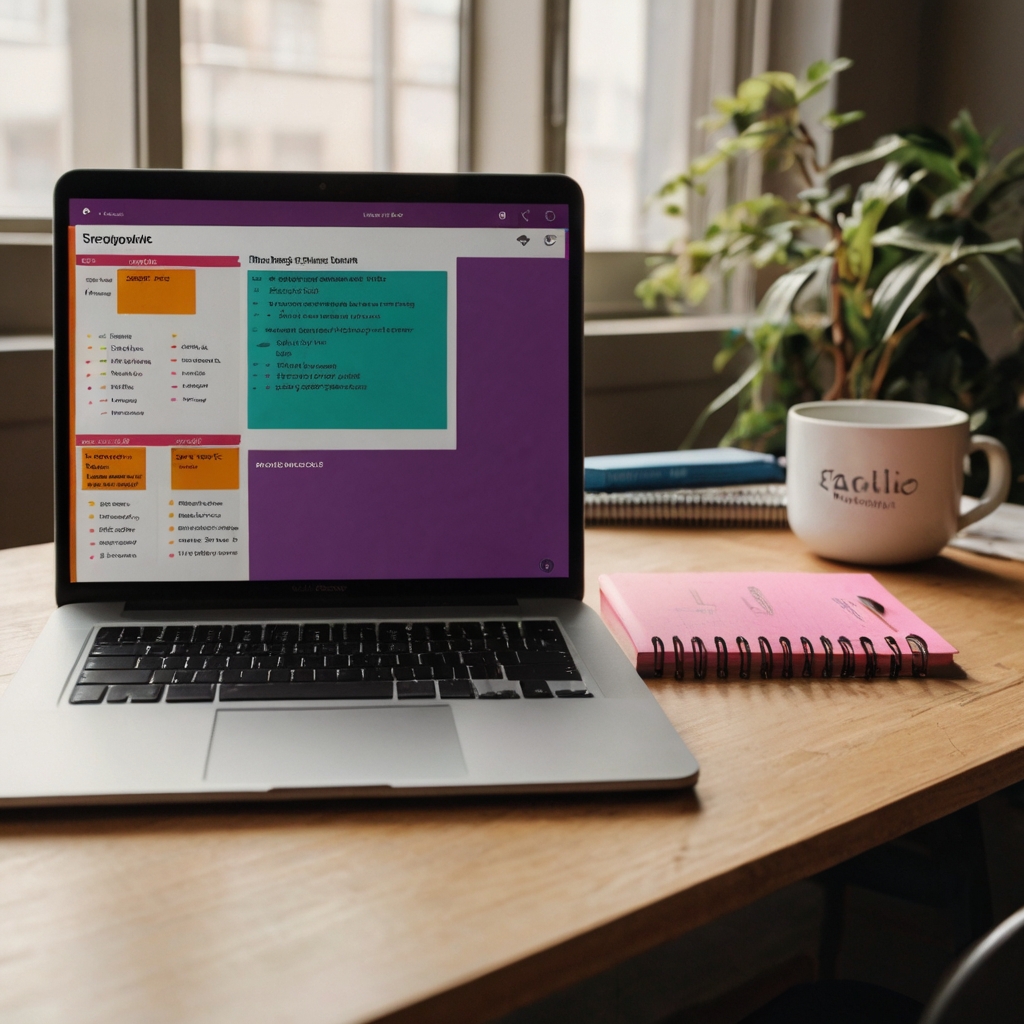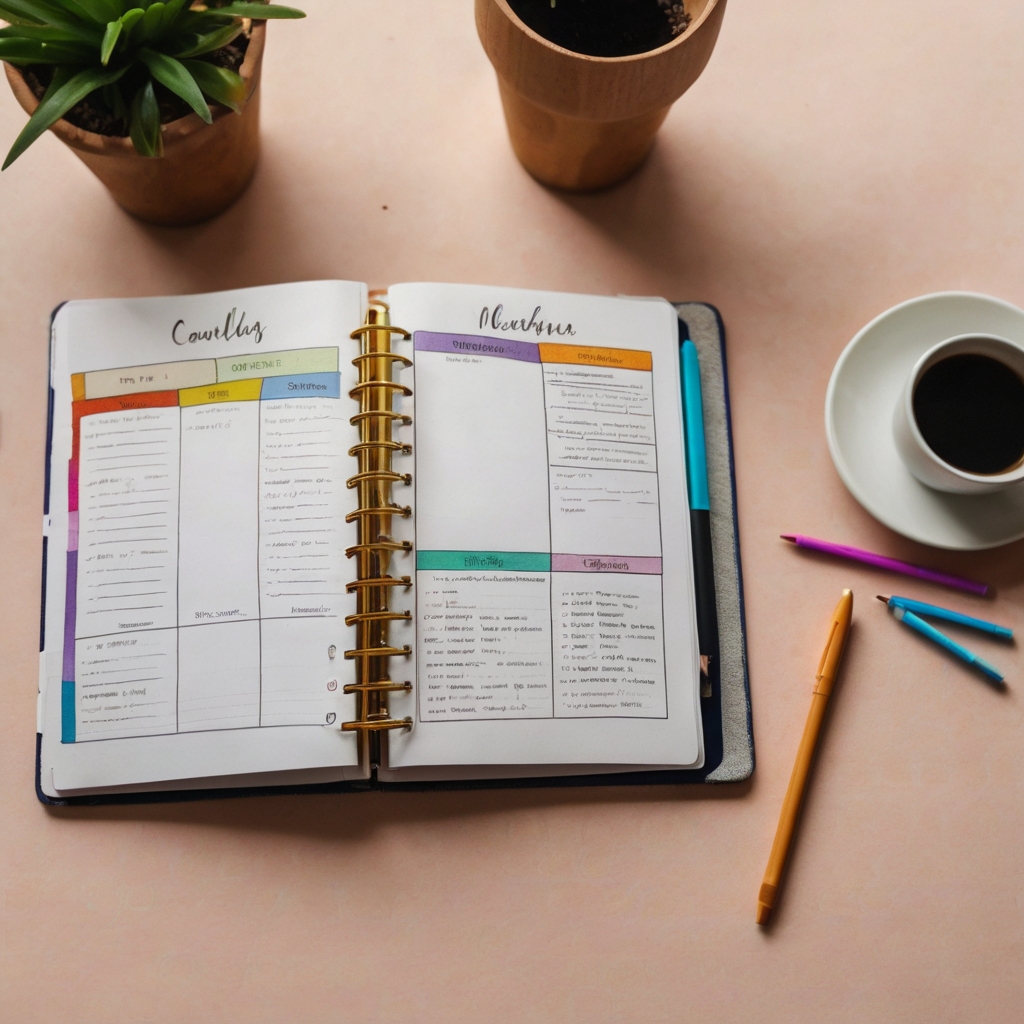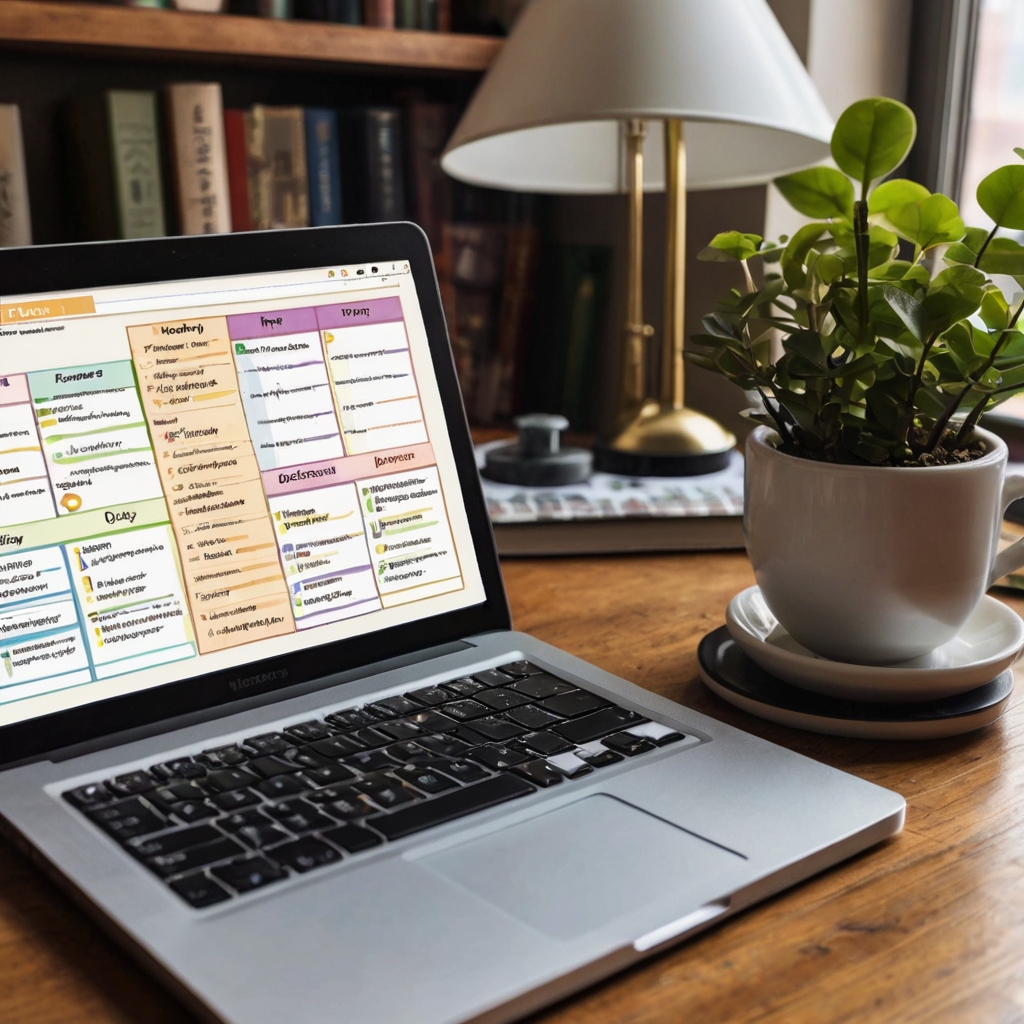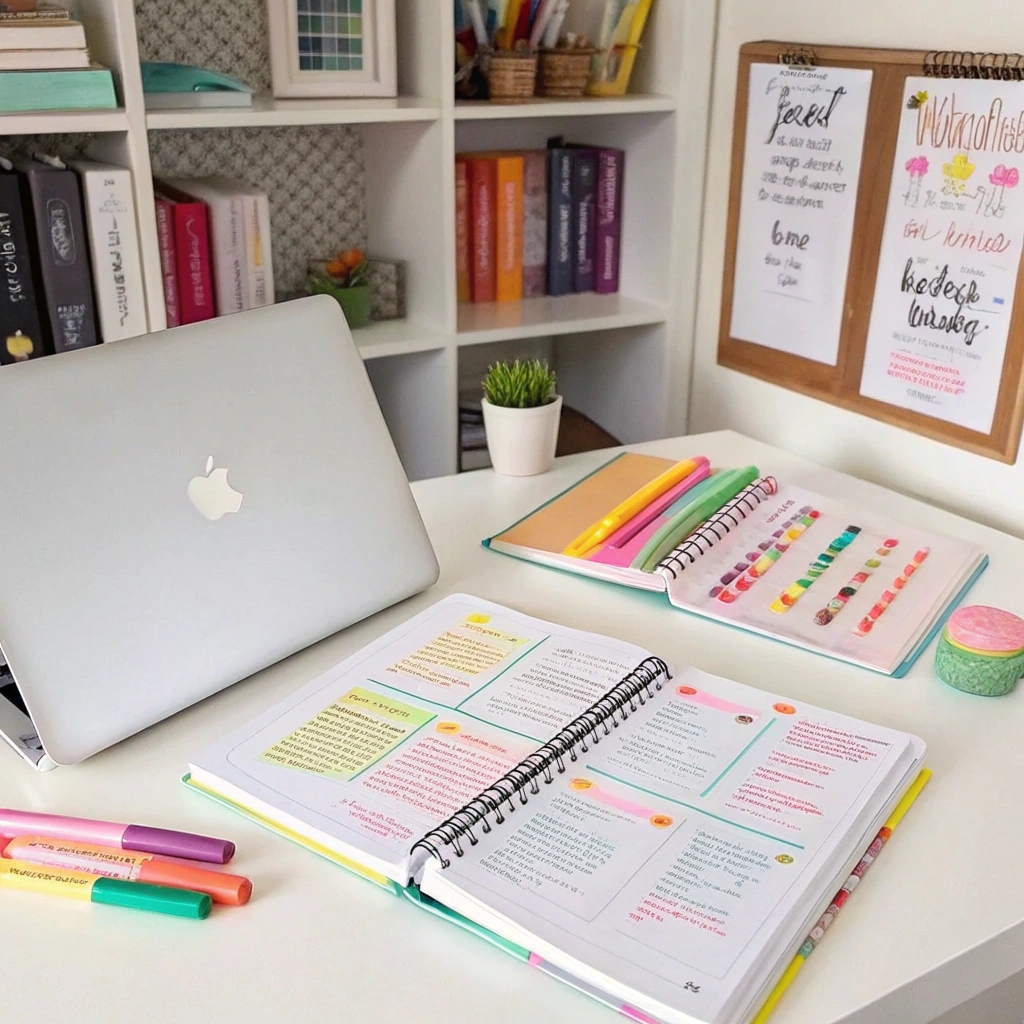Tired of feeling overwhelmed by your exam schedule, struggling to stay organized, and wasting precious study time?
We all know how stressful it can be – late nights studying, endless cups of coffee, and the pressure to perform well on exams.
But what if I told you there’s a better way?
The key is not in trying new techniques or buying expensive study guides. Instead…
It starts with understanding your learning style, setting clear goals for yourself each day/week/month.
With this simple yet powerful approach, you’ll be able to tailor your daily routine to fit your unique needs and achieve success without sacrificing sleep, social life or becoming a study zombie.
Setting Goals That Work For You
Mastering exams is often a challenge that requires careful planning and attention to detail. To get started, take some time to reflect on what works best for your learning style. Do you prefer structured study sessions or breaking it up into smaller chunks throughout the day?
Consider these questions: What subjects need more focus? Are there any topics where you feel constantly lost? And are there times when studying doesn’t seem to be helping, causing frustration instead of clarity.
Once those areas are identified, set specific and measurable goals. Break down large tasks into smaller ones that can be accomplished in a single study session. For instance if your goal is to learn all about American history then break it down by year or era rather than trying to read through the entire book at once.
Make sure these goals align with what’s best for you, and not just a preconceived notion of how things should be done. Consider creating separate study sessions for different types of material – like note-taking versus memorization techniques. This will help create a routine that is sustainable over time rather than feeling overwhelmed or forced.
Prioritize the most important topics first and then fill in any gaps afterwards to avoid having too much on your plate at once, making it easier to stay focused and motivated throughout the semester.
Creating A Study Space You Love
I’m talking to students like you who feel overwhelmed by their studies. You know how it feels when clutter hinders focus, but what if I told you there was a simple solution? Creating a dedicated study space can be the game-changer for your productivity and academic success.
Research has shown that cluttered spaces can lead to decreased productivity by up to 30%, making it harder to stay focused on your goals. On the other hand, an effective study area can boost cognitive function by 15% (Studies have shown that natural light can improve concentration).
To set yourself up for success, start with minimal decor. This doesn’t mean a blank slate add personal touches that inspire you! But keep in mind that less is more when it comes to decorations: cluttered spaces only lead to distractions.
Consider investing in an ergonomic chair and desk if possible. An ideal study space should be conducive to productivity, which includes features like adjustable arms on your chair or a document holder. This might seem daunting, but you don’t need top-of-the-line equipment; even a basic setup can help improve focus.
For instance, some students have reported that using blue light filtering glasses reduces eye strain and improves their studying experience. Experiment with different colors to see what works best for you; softer hues like mint or lavender can promote relaxation.
Lighting is another crucial aspect of your study space: consider investing in a desk lamp to supplement natural light when needed. A well-designed lighting system can significantly impact your mood and productivity, especially during exam periods.
Think about incorporating calming elements into your study space. Add plants with soothing colors or textures that evoke feelings of serenity; it might just help you feel more focused!
For example, some students swear by fiddle leaf fig trees to reduce stress while studying, as they provide a sense of calm and relaxation. Consider the greenery around you; if it doesn’t contribute positively to your focus, reevaluate its place in your study space.
To truly optimize your study area for productivity, maintain an environment that is well-ventilated, tidy and tailored just for you!
Prioritizing Tasks that Bring Joy

The truth is, traditional daily planners can be dull. But I’m here to show you how to make studying enjoyable.
You may think that using a study planner is just about scheduling tasks and meeting deadlines. However, it’s time to flip the script. Effective planners are those where you’re more likely to stick with them for the long haul – which means finding one that actually works *for* you.
Prioritizing Tasks that Bring Joy
Focusing on enjoyable tasks can make studying less painful. Here are some things about learning or studying that you might enjoy:
Learning something new, even if it takes time.
Writing in your journal after each study session to reflect and note down insights
Solving problems and puzzles as part of studying – it can be a fun way to keep your brain sharp
Let’s get creative! Here are some ideas on how you could incorporate these fun activities into your daily planner:
- Create a section for œBrain Breaks where you jot down three things that made you happy during the day.
- Add an extra page each week dedicated to writing about something new you’ve learned, along with why it’s interesting
- Set aside time slots specifically for solving puzzles or brain teasers.
The key is to make your study planner a reflection of YOU. Don’t be afraid to get creative and add sections that bring joy!
By focusing on the fun stuff, you can turn what would have been a chore into an enjoyable experience.
Mastering The Art Of Time Management
A customized daily study planner can be a powerful tool in optimizing exam performance. To master your exams, you need to find a system that fits your unique learning style and stick to it.
To make the most of your study time, try these strategies:
- Use calendars, planners, or apps to identify your optimal study times and set realistic goals for each day.
- Allocate sufficient sleep time to avoid burnout and ensure you’re well-rested for learning.
By minimizing distractions during study periods, you can stay focused on the task at hand. Consider implementing an “no phone zone” rule in your designated studying space or using tools like website blockers to reduce digital distractions.
Don’t let social media, email notifications, or other digital temptations derail your focus! Explore ambient noise machines or music as a secret study buddy that’ll help you stay on track.
So, what’s holding back your academic success? Is it lack of time management skills or simply not having the right study plan?
With this customized daily planner in place, you’ll be amazed at how much easier it is to grasp exam material like never before. By following these simple steps and tips, you can master your exams.
When designing your daily planner, consider these additional tips to enhance productivity:
- Schedule dedicated time for relaxation and self-care – yes, it’s essential!
- Identify potential sources of procrastination (e.g., social media) and find alternative habits
Don’t overcrowd the schedule, leave space for flexibility and spontaneity. And remember, reviewing your planner regularly is key to making adjustments as needed.
By implementing these strategies, you’ll be well on your way to mastering The Art Of Time Management.
Overcoming Test Day Jitters with Breathing Techniques
Did you know there’s a simple breathing technique that can help calm your nerves and get you focused on acing those exams? One approach is diaphragmatic breathing, which requires more effort and engagement than shallow chest breathing.
Diaphragmatic Breathing: This technique helps reduce anxiety by engaging the body in a different way. To practice diaphragmatic breathing, lie on your back or sit comfortably with your back straight. Place one hand on your stomach and the other on your chest. Inhale slowly through your nose, allowing your stomach to rise as you inhale; Your hand should move outward from its initial position.
This technique can be especially helpful when feeling anxious before a test. As you take deep breaths in this way, try to focus only on each breath and let go of any distracting thoughts. By doing so, you’ll start to feel your body relax and your mind clear up.
Practice diaphragmatic breathing regularly, such as right before a test or during stressful situations, and you’ll find it gets easier with time. This will help reduce those pesky test day jitters.
Box Breathing: Another technique that can be particularly helpful is box breathing, which takes practice to master. To get started with this exercise in self-regulation, take slow, deep breaths through your mouth until you feel calm enough to continue. Once you’re feeling more centered, breathe normally for about 30 seconds without counting or focusing on anything else but the sensation of each inhale and exhale.
Incorporate breathing exercises into your daily routine to help manage stress and stay focused under pressure. By practicing these techniques regularly, you’ll become more comfortable with taking slow breaths in high-stress situations.
How Sleep Impacts Your Brainpower

Maximize Your Exam Scores with Our Proven System
If you’re struggling to focus and retain information during exam periods, it’s time to rethink your study routine. Adequate sleep is key to unlocking better academic performance, but what happens when you don’t get enough rest? In this article, we’ll explore the impact of lack of sleep on cognitive function during exams and provide practical tips for overcoming these challenges.
Here are some surprising ways that poor sleep can affect your ability to focus and learn:
Your brain’s “power mode” is compromised: When you’re well-rested, your brain functions at its best. During study sessions, it processes information efficiently, leading to better retention and recall.
Reduced productivity puts pressure on exams: Lack of Sleep impairs cognitive function during study sessions. As a result, students may struggle to perform their best under time pressure.
When you’re tired, your brain’s ability to process information decreases significantly. This can have severe consequences on exam performance:
Decreased cognitive function leads to reduced focus and motivation: Without sufficient sleep, the less capable your brain is at focusing during study sessions.
Your Brain Power Decreases: The more Sleep Deprivation you experience the harder it will be when trying to learn or Focus During Study Sessions.
To improve these issues that arise from lack of sleep for students, here are some practical strategies:
Adequate sleep sets the stage for success: By getting enough rest before an exam, your brain is better equipped to process information efficiently.
- This enables better retention and recall
- Ultimately leading to improved academic performance in exams
Insufficient Sleep Can Have Severe Effects on Cognitive Function During Study Sessions:
By making a few simple changes, you can boost your cognitive function and perform at your best. By incorporating these tips into your daily routine, you’ll be well-prepared for success.
How Daily Planning Helps Boost Confidence
Using a customizable planner to manage time and prioritize tasks can make studying more enjoyable by providing clear goals and deadlines:
Customize Your Study Plan: Make a plan that sets achievable goals that motivate You.
This will give you the confidence you need when it is time for Exams.
By setting yourself up for success, you’ll be able to focus on your studies with renewed energy.
Using Visual Aids to Enhance Retention
Are you tired of feeling overwhelmed by complex study materials? Discover how a customizable daily study planner can help you master exams with confidence.
Leveraging visual elements is a game-changer when it comes to mastering exams. Visual aids don’t just enhance retention and comprehension – they transform the way we approach studying. By incorporating visual elements into your daily routine, you’ll be able to stay on track and make progress towards exam goals with ease.
One powerful way that visual aids enhance retention is through the use of color-coding. You might wonder how to effectively incorporate color into your study routine. A great start would be by creating a legend for each subject. For example, if you’re studying math and science, assign red to those subjects and blue for history and English.
Here’s an example: imagine being able to instantly identify which topics need more focus with just one glance at your planner. With color-coding, this becomes possible! Not only will it boost your productivity but also help reduce stress levels as you stay organized. The key is finding a color scheme that works for you and sticking to it.
Visual aids aren’t limited to simple organization tools like calendars or to-do lists either. Creating diagrams can help illustrate complex relationships between ideas, making it easier to grasp even the most challenging concepts.
What if I told you there’s an easy way to simplify your studying process? It starts with creating a system that works for you – one that incorporates visual aids in a meaningful way. Let me show you how:
Customize Your Planner: Don’t use a generic planner; instead, create one tailored to your needs.
Color-Coding Made Easy:
Assign colors to different subjects (e.g., green for languages, yellow for history).
Use diagrams to illustrate complex relationships between ideas.
Prioritize tasks and break them down into manageable chunks.
By making these small adjustments to your study routine, you can unlock the full potential of visual aids in exam preparation. So what are you waiting for? Get ready to master exams with confidence – one customizable daily planner at a time!
Building A Support System For Success
Are you tired of feeling isolated in your academic journey? Having a solid support system can make all the difference.
A good support system is more than just having someone to rely on – it’s about finding individuals who understand what drives and motivates each person, whether that’s pushing for improvement or offering words of encouragement.
To identify what you’re looking for in friends, start by considering your study habits and goals. You may need people who are familiar with how you approach challenges or ones who can help keep you accountable. Think about specific behaviors or traits – such as regular check-ins or providing constructive feedback.
You might find these types of networks through online forums related to the subject area, group projects in class, or volunteer work for causes that align with your passions. You could also ask friends and mentors from your past who have overcome similar obstacles in their own academic journeys.
One particular network you may want is made up of positive influences – people whose optimism and positivity can help push you forward even when the going gets tough.
You might look to find these individuals by joining clubs or organizations related to what you’re studying, which could provide valuable connections with peers who share similar interests and values. To get a better sense of their impact on your academic journey, take note of how they make you feel: Do they motivate and support when needed? Or do they offer sage advice that helps guide decisions?
You need people around you who will understand what it’s like to face challenges – whether that’s a parent, friend, or even an online mentor. In fact, there are potential pitfalls in forming these relationships; for example, dealing with differing opinions can sometimes lead to frustration.
While joining study groups or clubs is one way to find supportive networks. A more nuanced answer comes from recognizing how certain types of support systems could help mitigate academic challenges – such as finding individuals who have experienced similar setbacks and learned valuable lessons from their experiences.
Embracing Mistakes As Learning Opportunities

Embracing mistakes as learning opportunities is crucial to efficient and effective studying. By viewing errors as valuable teaching moments, you can develop resilience and confidence.
For instance, a study by educational psychologist Carol Dweck found that students who view mistakes as opportunities for growth tend to perform better than those who fear failure. This concept has been backed up by research showing that individuals with a growth mindset are more likely to take risks, persist in the face of obstacles, and innovate all essential skills for academic success.
To harness this effect, incorporate feedback into your daily planner. Set aside time each day or week to review past exams or practice tests. Identify areas where you struggled and create targeted strategies for improvement. For example, if math was an area where you consistently scored poorly on the SATs last year, make a plan to dedicate extra time to algebra this semester.
Think of your mistakes as speed bumps on the road to success. They may slow you down, but with a growth mindset, you’ll navigate them and come out stronger. By reviewing past errors and using those insights for improvement, you can eliminate weaknesses and focus on building strengths. This process allows you to refine your skills incrementally, gradually improving your overall performance.
By doing so, not only will it help build trust in yourself as a student; but also enhance the chances of success during exam weeks making this process worth considering as an indispensable part of studying efficiently.
Staying Organized On Exams Day
Mastering Your Study Plan is Key
Having a well-structured schedule helps reduce stress and increases focus.
A customizable daily study planner allows you to tailor your studies to fit your unique learning style, pace, and needs. By allocating specific time slots for each subject or topic, students can prioritize their tasks effectively and avoid last-minute cramming.
By sticking to the plan consistently, you’ll be able to make steady progress in reviewing material that is familiar with less anxiety on exam day. Your brain will thank you as well because it won’t have to work overtime trying to recall a lot of information at once.
Take advantage of this study planner today and give yourself an edge over your peers who are still scrambling for answers.
Make studying fun by customizing the plan that is just right for you, and watch how your grades will soar.
